Ethiopia embarks on e-mobility transition amid rising fuel prices, quest for green dev't
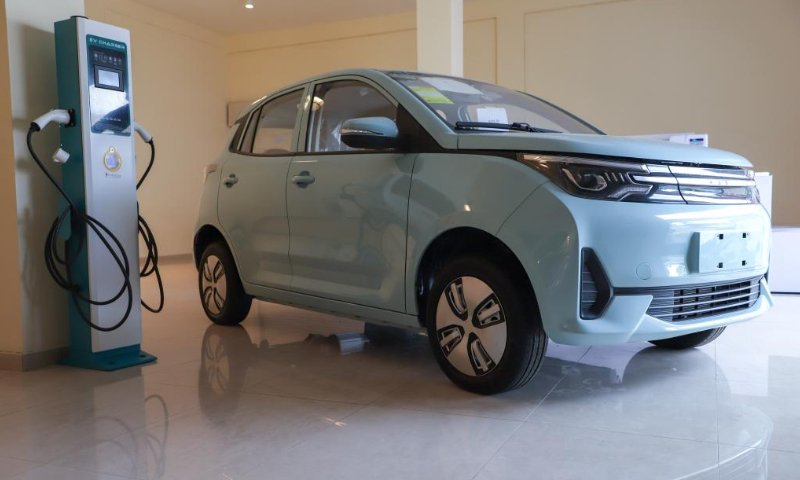
Photo taken on July 22, 2022 shows an electrical vehicle imported by Green Tech Africa and a charging station at its showroom in Addis Ababa, Ethiopia. Photo: Xinhua
A striking phrase written in Amharic, Ethiopia's working language, is visible on each side of cars displayed inside a showroom located on the outskirts of Addis Ababa, the capital of Ethiopia. The phrase reads "An Electric Vehicle" -- a rare sight in a country where electric mobility is in its infancy.
The showroom, which exclusively displays a wide range of electric vehicles for potential Ethiopian buyers, belongs to Green Tech Africa, an East African-based renewable energy company that works in partnership with major Chinese electric vehicle manufacturers as part of its aspirations to promote electric mobility in Ethiopia and beyond across the African continent.
As the Ethiopian government recently engaged in an ambitious effort to fast-track the transition into electric mobility in the face of the global fuel uncertainties, the company has recently partnered with the Ethiopian Ministry of Transport in a series of events that envisaged creating public awareness of e-mobility.
One such initiative is a one-month-long free electric vehicle transportation campaign for Addis Ababa residents.
The phenomenon has caught the attention of many on the streets of Addis Ababa, most of whom are experiencing their first-ever battery electric vehicle excursion.
Kidem Tesfaye, Chief Executive Officer (CEO) of Green Tech Africa, said that a growing number of Ethiopians are lately interested in electric cars.
The Ethiopian government, preoccupied with the mammoth cost of fuel that was further exacerbated by the current global fuel price hikes, is recently promoting electric vehicles as a viable solution.
The East African country spends an estimated annual average of 4 billion U.S. dollars for the purchase of fuel, according to government figures. For comparison, Ethiopia's overall export revenue during the Ethiopian 2021/2022 fiscal year that ended earlier this month was 4.12 billion U.S. dollars.
Experts argued that Ethiopia, which spends a major part of its forex earnings on fossil fuels, should tap into the global climate change agenda as its priority to reduce emissions.
"As a water tower of Northeast Africa, Ethiopia is potentially endowed with plenty of hydroelectric potential. Hence, it makes sense that we look to electric cars as a future machine of mobility," Costantinos Bt. Costantinos, professor of public policy at the Addis Ababa University in Ethiopia, told Xinhua in a recent interview.
"Carmakers are looking at alternative fuel sources, with the aim to reduce harmful exhaust emissions while still delivering the kind of all-round performance and range capabilities," Costantinos said, as he advised Ethiopia to follow suit.
The Ethiopian government, as part of its 10-Years Perspective Development Plan that runs from 2021 to 2030, plans to import 4,800 electric buses and 148,000 electric automobiles.
Tesfaye argued that cognizant of the current global shift toward electric vehicles, the East African country should aspire even higher.
Many argue that Ethiopia's transportation system has been a key source of carbon dioxide emissions with the influx of cheap used cars that are imported into the country, where brand new cars are a rare sight and electric vehicles are nearly unheard of until very recently.
Tesfaye emphasized that Green Tech Africa, working in collaboration with its Chinese partners, envisaged changing the situation by introducing Chinese-made electric vehicles that are convenient to the local demand.
The company currently is importing the cars from Chinese car manufacturer Dongfeng Motor Corporation and has plans to establish a car assembly factory in the near future toward realizing its ultimate goal of becoming the manufacturing hub of electrical vehicles in Africa.
"Within the next ten years, we see Green Tech Africa (becoming) the manufacturing hub of electrical vehicles and having at least 60 percent of the electric vehicle components manufactured locally," Tesfaye said.
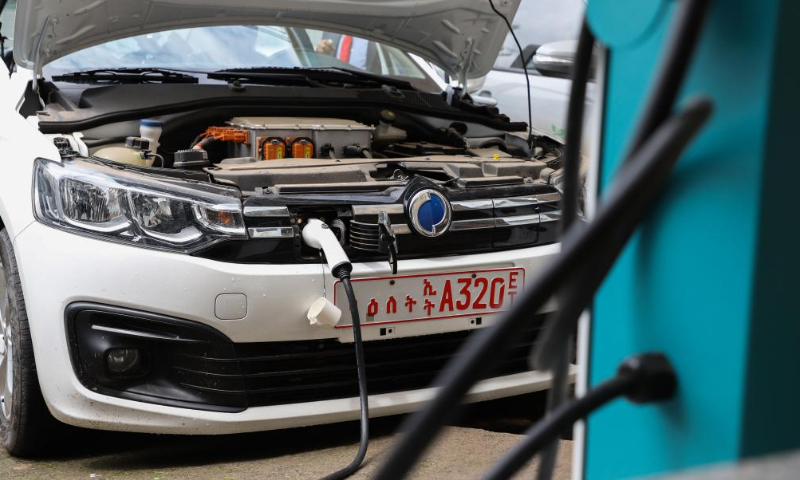
An electrical vehicle imported by Green Tech Africa is charged at its showroom in Addis Ababa, Ethiopia, on July 22, 2022. Photo: Xinhua
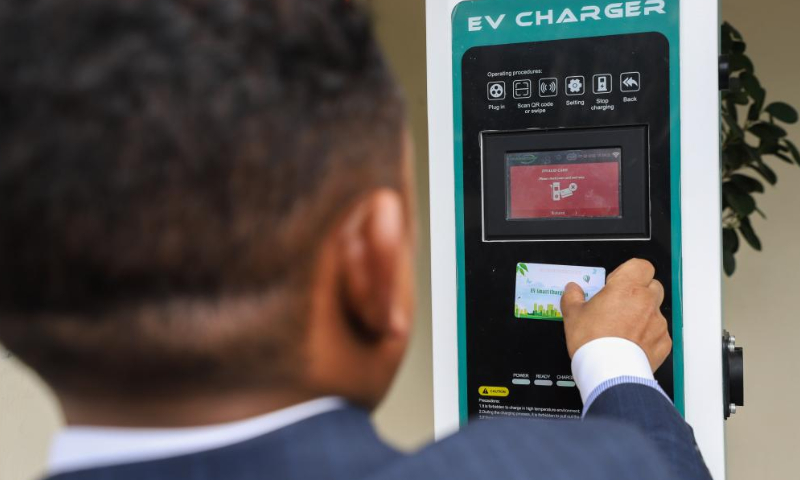
Kidem Tesfaye, chief executive officer of Green Tech Africa, shows how to operate a charging station at a company showroom in Addis Ababa, Ethiopia, on July 22, 2022. Photo: Xinhua
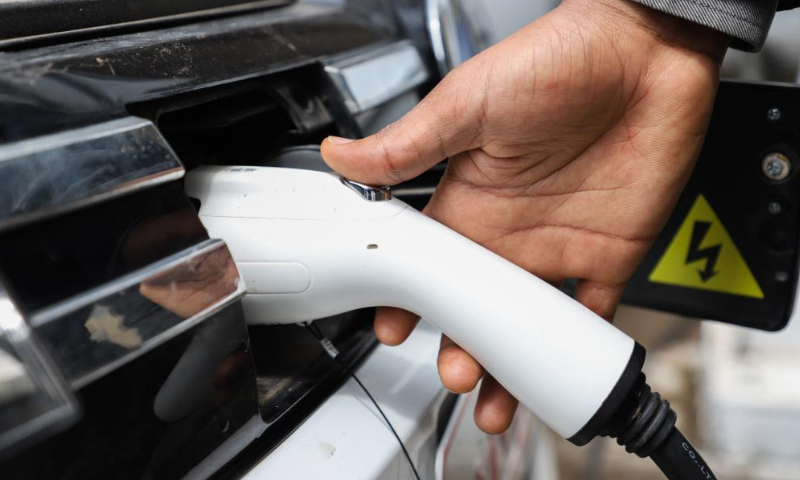
An electrical vehicle imported by Green Tech Africa is charged at its showroom in Addis Ababa, Ethiopia, on July 22, 2022. Photo: Xinhua
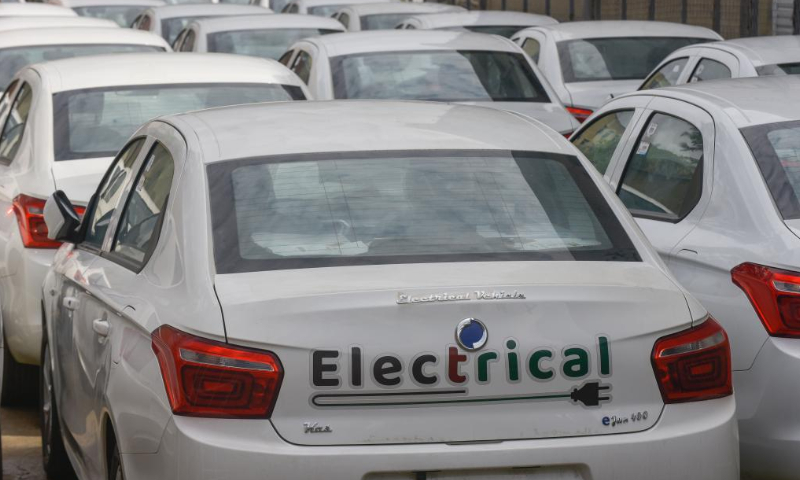
Photo taken on July 22, 2022 shows electrical vehicles imported by Green Tech Africa in Addis Ababa, Ethiopia. Photo: Xinhua
